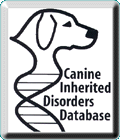
Shaker dog syndrome
This disorder develops suddenly in young adult, primarily small white dogs, causing a diffuse tremor of the entire body. The cause is unknown although there is speculation that there may be a generalized neurotransmitter deficiency due to an autoimmune reaction.
unknown.
This disorder usually develops suddenly in young adult dogs (6 months to 3 years of age). The signs become progressively worse over 1 to 3 days and then remain the same until treatment is begun. There is an all-over tremor that can range from mild to so severe that the dog may have difficulty walking. This is called an intention tremor, meaning that it is worse when the animal is excited or trys to perform a specific action (such as eat, walk towards an object, etc). The tremor decreases or disappears when the dog is relaxed or at rest. Commonly there are rapid, random eye movements as well.
The condition is not painful and your dog's personality is unaffected. Treatment is generally effective; some dogs require medication for life to control the tremors.
Your veterinarian will diagnose this condition based on the clinical signs and the fact that tests for other possible causes of these signs show no abnormalities.
Most dogs recover completely with early treatment with corticosteroids and/or benzodiazepines. Your veterinarian will start your dog at a relatively high dose which is gradually decreased over several weeks. Clinical signs usually begin to improve within a few days of starting treatment, but If treatment is stopped too early the signs usually return. Some dogs may have to remain on a low dosage on alternate days for life, so as to remain free of signs of the disorder.
Intention tremors may be mild to severe, affecting all 4 limbs and the head. There is mild to moderate hypermetria and occasionally a head tilt. Conscious proprioception, spinal and higher reflexes, cranial nerves, personality and voluntary motor functions are unaffected. Para- or tetraparesis may occur.
Although little is known about the inheritance, dogs who have developed this disorder should not be bred.
FOR MORE INFORMATION ABOUT THIS DISORDER, PLEASE SEE YOUR VETERINARIAN.
Parker, A.J. 1995. "Little white shakers" syndrome: generalized, sporadic, acquired, idiopathic tremors in adult dogs. In J.D. Bonaguara and R.W. Kirk (eds) Kirk's Current Veterinary Therapy XII Small Animal Practice. pp. 1126-1127. W.B. Saunders Co., Toronto.
- (Disorder) related terms:
- Disorder Type:

